|
|
|
Sort Order |
|
|
|
Items / Page
|
|
|
|
|
|
|
| Srl | Item |
| 1 |
ID:
176716
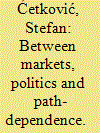

|
|
|
|
|
| Summary/Abstract |
This article contributes to the recent scholarly attempts towards bridging different energy studies perspectives in explaining the change of energy systems. Informed by political, socio-technical and techno-economic perspectives on energy transitions, we focus on explaining the divergent solar and wind power deployment rates across six Central and Eastern European countries. We suggest and test the proposition that the interplay of four key factors has shaped this development: state capacities, relations with Russia, technological lockin and electricity import dependency. We find that the countries relations towards Russia, the level of nuclear power lock-in and the state intervention in the energy sector have been instrumental in affecting the adoption of wind and solar power. The integrated framework and the findings presented in the article should encourage future energy transition research to capture and trace the interplay among different factors in an integrated and comparable manner.
|
|
|
|
|
|
|
|
|
|
|
|
|
|
|
|
| 2 |
ID:
128993
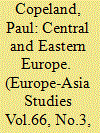

|
|
|
|
|
| Publication |
2014.
|
| Summary/Abstract |
This article analyses the influence and status of the Central and Eastern European states within an enlarged European Union. It analyses two European Union policy negotiations: the Services Directive and the European Union's Financial Crisis Rescue Plan. Central to understanding the influence of a member state within negotiations are its economic size and knowledge of the Brussels policy-making apparatus. Nevertheless, as the new member states from Central and Eastern Europe have gained experience of the European Union policy negotiation process, they remain limited in their ability to influence outcomes. Therefore it can be concluded that while knowledge during negotiations is a necessary condition for successfully influencing outcome, alone it is insufficient because economic weight is particularly pertinent to those outcomes. As a result, the status of the new member states within the European Union is best described as being that of a junior partner, despite the assumed parity of Union membership.
|
|
|
|
|
|
|
|
|
|
|
|
|
|
|
|
| 3 |
ID:
189369
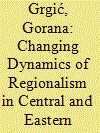

|
|
|
|
|
| Summary/Abstract |
As the Central and Eastern European (CEE) states undergo a populist-nationalist revival, perhaps the most perplexing phenomenon has been the vibrancy of subregional cooperation initiatives. The Three Seas Initiative (TSI) is the most recent platform to join the list. While it is still too early to deliver a verdict on the effect this initiative will have on the future of European integration, it is indisputable that it marks a shift in the dynamics of European subregionalism. Namely, some of the states that are spearheading and supporting the initiative seem to be openly contesting European unity, which runs counter to the previous initiatives that were formed in support of further EU integration. This article analyses CEE’s standing within the EU in the context of TSI and argues that both rationalist and normative foundations of the most recent wave of subregionalism have significantly changed compared to the previous instances of subregional cooperation.
|
|
|
|
|
|
|
|
|
|
|
|
|
|
|
|
| 4 |
ID:
128994
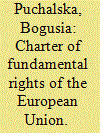

|
|
|
|
|
| Publication |
2014.
|
| Summary/Abstract |
The proclamation of the Charter for Fundamental Rights of the European Union, in December 2000 at Nice, France, followed by its inclusion within the failed Constitutional Treaty and its current status as a legally binding document under the Treaty of Lisbon, charts the changing fortunes of European Union politics dealing with fundamental rights protection. This article outlines the main rationales and hopes behind the enactment of the Charter and notes that through the process of political conditionality it may have been devalued from its very conception. The article suggests that, following their accession, Poland, and later the Czech Republic, used the Charter and Lisbon Treaty negotiations, including their opt-outs from the Charter, to engage in a game of power politics that had both domestic and European undertones. This politics of power game-play reflected a need by both states, and Poland in particular, to respond to both the political conditionality that they had been required to sign up to as part of the accession process and to emphasise how membership had improved their negotiating power. The article suggests that the consequence of this action by both states has not only further devalued the Charter but potentially undermined the rights of Polish and Czech citizens.
|
|
|
|
|
|
|
|
|
|
|
|
|
|
|
|
| 5 |
ID:
170658
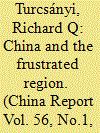

|
|
|
|
|
| Summary/Abstract |
Central and Eastern Europe (CEE) had few historical opportunities to interact with China, but with the Belt and Road Initiative (BRI) and the 16+1 platform, that changed dramatically in recent years. The article discusses recent development in the China-CEE relations with the aim of explaining why the CEE countries became excited about China initially, but also why this excitement led prevailingly to disappointment. It will be argued that the frustration with the EU in the aftermath of the 2008 crisis created an environment in which China was, for a moment, perceived as a promising alternative. A few years into the new diplomatic initiatives, however, most of the CEE countries started to be unsatisfied with the lack of economic results. Eventually, the article will assess the implications of the new era of China-CEE relations for the EU affairs and broader Chinese relations with the developing world. The CEE region is in a specific position vis-à-vis China, for it is structurally in between the developed and the developing world. Moreover, the EU membership adds some critical features which make the Chinese offer less applicable and appealing.
|
|
|
|
|
|
|
|
|
|
|
|
|
|
|
|
| 6 |
ID:
169131
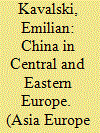

|
|
|
|
|
| Summary/Abstract |
The Central and East European (CEE) part of the Eurasian landmass is often overlooked in the conversations on contemporary geopolitics. Yet, owing to China’s relations with the CEE countries, the region has been subject to growing strategic attention. This article offers a brief overview of the history of this relationship by focusing on the “17+1” mechanism. Nestled within the broader Belt and Road Initiative (BRI), the “17+1” has provided a unique regional arrangement for extending Chinese influence in the sixteen CEE countries. The article inquires whether there is something else than the instrumental economic reasoning for the willingness of CEE countries to partner with China. The analysis detects three distinct strategic narratives motivating the participation of CEE states in the “17+1” mechanism. The study concludes with an enquiry on China’s preparedness to respond to such identity geopolitics not only in the CEE region, but throughout the vast expanse covered by the BRI initiative.
|
|
|
|
|
|
|
|
|
|
|
|
|
|
|
|
| 7 |
ID:
168915
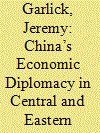

|
|
|
|
|
| Summary/Abstract |
Since China launched the 16 + 1 forum for meetings with Central and Eastern European (CEE) countries in 2012, European observers have struggled to understand the Chinese approach. In contrast to its oft-repeated claim of ‘win–win’ cooperation, some believe China is pursuing an assertive strategy of ‘divide and conquer’ designed to benefit China at Europe’s expense. China’s economic diplomacy in CEE is examined through the critical lens of Holslag’s ‘offensive mercantilism’ framework, finding it useful for assessing empirical aspects of China’s approach to CEE, but failing to find evidence for the assertion that China’s economic diplomacy is divisive and bad for Europe.
|
|
|
|
|
|
|
|
|
|
|
|
|
|
|
|
| 8 |
ID:
190481
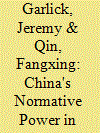

|
|
|
|
|
| Summary/Abstract |
Normative power China (NPC) has characteristics distinct from Manners’ conception of normative power Europe (NPE). While NPE attempts to establish rules for interaction, NPC introduces practices to be co-constituted via regional platforms through a process of ‘earned recognition’. In Central and Eastern Europe (CEE), NPC’s regionalising ‘group cooperation diplomacy’ has taken the form of the ‘16/17 + 1’ cooperation framework. Using normative power theory, the article assesses, via a critical discourse analysis of speeches and interviews, how and why China’s attempts to shape practices, earn recognition and create a community of practice in CEE have met with—at best—only limited success.
|
|
|
|
|
|
|
|
|
|
|
|
|
|
|
|
| 9 |
ID:
147659
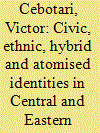

|
|
|
|
|
| Summary/Abstract |
While the topic of identity of ethnic minorities abounds in theoretical insights, most discussion is still clustered around the civic–ethnic divide while assuming conclusions with limited empirical evidence. By contrast, this article uses a four-category typology of identity that considers both in-group and out-group attachments to address hypotheses about competing identities and about factors influencing minorities to adopt one identity type over others. Based on unique data evidence of 12 ethnic minorities in Central and Eastern Europe, this study concludes that the ‘hybrid’ identity, rather than the literature-assumed ‘ethnic’ identity, tops the identification preference of minorities, although there are differences in levels and patterns when controlling for various covariates. The choice of identity depends on the socialisation process, the economic status, the perceived discrimination and intergroup tensions, reflecting variations in the system of values common to a region with complex ethnic dynamics.
|
|
|
|
|
|
|
|
|
|
|
|
|
|
|
|
| 10 |
ID:
192616
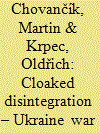

|
|
|
|
|
| Summary/Abstract |
Progress made in European defence-industrial integration has been subjected to the hardest test with the 2022 Russian invasion of Ukraine. The conflict has had profound implications for European defence industries across the board and spurred on massive investment into the sector. Based on extensive analysis of procurements, adopted policies, and shifts in discourse, we argue that the practical steps undertaken by Central and Eastern European (CEE) defence industries in the wake of the conflict are disintegrational. This is contrary to many discernible indicators which align with European integrational initiatives in defence. Moreover, the paper argues that the pattern of decisions taken by Central and Eastern European countries reinforces structural barriers to potential future European defence-industrial integration. The findings are significant to EU-wide, regional, and bilateral defence-industrial co-operation as well as national defence industrial strategies in reaction to the ongoing war in Ukraine.
|
|
|
|
|
|
|
|
|
|
|
|
|
|
|
|
| 11 |
ID:
178846
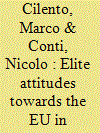

|
|
|
|
|
| Summary/Abstract |
The EU integration process is commonly recognised as a top-down initiative coordinated by elites. Do the differentiated patterns of EU politicisation across countries create a demarcation between two regions, namely Western Europe and Central and Eastern Europe? Through the analysis of data obtained by a standardised survey questionnaire submitted to a representative sample of national political elites in ten countries, we show that elite attitudes are uneven across countries and contingent on different issues. Although the distance between elites in the two regions is significant, elite attitudes do not necessarily qualify as irreducibly Eurosceptic in Central and Eastern Europe.
|
|
|
|
|
|
|
|
|
|
|
|
|
|
|
|
| 12 |
ID:
171700
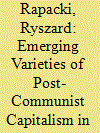

|
|
|
|
|
| Summary/Abstract |
The aims of the present article are three-fold. First, we conduct a survey of the most representative theoretical and empirical research on the emerging varieties of post-communist capitalism in Central and Eastern Europe. We critically review standard conceptual frameworks, their applications and derivatives, and non-standard approaches. Second, we highlight the major peculiarities of institutional development in CEE countries that make the direct application of both standard and non-standard theoretical frameworks problematic. Finally, we outline the possible directions of future research on the emerging models of post-communist capitalism and suggest essential extensions to the methodology involved.
|
|
|
|
|
|
|
|
|
|
|
|
|
|
|
|
| 13 |
ID:
147661
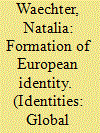

|
|
|
|
|
| Summary/Abstract |
Research into European identity has mostly focused on majority populations in Western European countries, neglecting new member states in Central and Eastern Europe (CEE) as well as ethnic minority groups. This paper contributes to filling this gap by exploring and investigating processes of European identity formation of five ethnic minority groups in four CEE countries. A generational perspective was applied by conducting qualitative in-depth interviews with three generations of ethnic minority group members. The results support the instrumental approach of identity construction. In all minority groups researched, the young generation, due to more positive personal experiences and perceived benefits from the European Union, have developed more positive images and perceptions of Europe and a greater sense of European identity than older generations. Furthermore, ethnic group-specific processes of identity formation were found.
|
|
|
|
|
|
|
|
|
|
|
|
|
|
|
|
| 14 |
ID:
160833
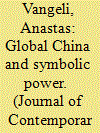

|
|
|
|
|
| Summary/Abstract |
This article analyzes the practice and effects of China’s new foreign policy by applying a research framework inspired by Bourdieu(s)ian international political sociology centered on the notion of symbolic power. To analyze China’s symbolic power in action, the article uses the case of the cooperation between China and the 16 countries of Central, East, and Southeast Europe, dubbed ‘16 + 1’. It discusses how, through symbolic domination that rests on concealing the true meaning of the cooperation, China contributes to changes in the established notions on boundaries, historical legacies, and development paradigms in the region of Central and Eastern Europe (CEE).
|
|
|
|
|
|
|
|
|
|
|
|
|
|
|
|
| 15 |
ID:
147658
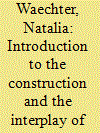

|
|
|
|
|
| Summary/Abstract |
This special issue challenges the concept of fluidity and flexibility of identities by demonstrating that ‘new’ European identity is not easily adopted and that the co-existence of ethnic and national identities is an ongoing process of negotiation. The theoretical approach assuming multiple identities can be confirmed for ethnic minorities in Central and Eastern Europe who were often thought to be focused on ethnic identities. This issue provides empirical quantitative and qualitative evidence for showing that ethnic minorities typically relate to their ethnic identity and to the national identity of their residence country simultaneously. The individual papers reveal that the development and maintenance of ethnic, national and European identities are often linked to the socio-economic situation and possible benefits. Also, social and cultural practices such as language and media consumption are crucial for the construction of identities. Furthermore, articles in the special issue highlight that national and European politics, above all minority rights and integration policies, may contribute to ethnic and European identification.
|
|
|
|
|
|
|
|
|
|
|
|
|
|
|
|
| 16 |
ID:
132938
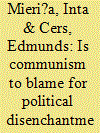

|
|
|
|
|
| Publication |
2014.
|
| Summary/Abstract |
In this article, we apply a new, original technique of cohort analysis to test empirically whether political disenchantment in the post-communist countries of Central and Eastern Europe can be linked to the previous political culture. On the basis of International Social Survey Programme 1996 and 2006 data we find a surprisingly similar and unique cohort effect in all analysed post-communist countries, reflecting persistent generational differences in perceived political competence (interest and understanding of political processes). However, the communist legacy does not seem to be important for explaining low self-efficacy or distrust in political authorities and their responsiveness to citizens' demands.
|
|
|
|
|
|
|
|
|
|
|
|
|
|
|
|
| 17 |
ID:
169130
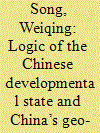

|
|
|
|
|
| Summary/Abstract |
This study addresses China’s cooperation with Central and Eastern European (CEECs) countries, centred around what is popularly known as the ‘16 + 1’ process. It aims to unravel the link between China’s domestic sources and its ambition to become an international leader in the global economic order and governance related to Central and Eastern Europe (CEE). It argues that China’s economic expansion to faraway regions like CEE is a necessary outgrowth of its developmental state model, both economically and politically. The nature of this model has largely dictated China’s way of engaging the CEE region and its concomitant outcomes and responses. Although the era of globalisation has afforded China good opportunities to expand in the global economic domain, it has found itself substantially constrained by diverse factors, both domestic and external. Despite some notable progress, this complexity requires China to generate feasible strategic choices if it wishes to succeed in its global economic endeavours. Given that China must adapt to the outside world, its foreign partners should in turn accommodate China in this globalised world.
|
|
|
|
|
|
|
|
|
|
|
|
|
|
|
|
| 18 |
ID:
139728
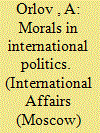

|
|
|
|
|
| Summary/Abstract |
THE WORLD is changing fast; it is changing by leaps and bounds which makes it next to impossible to explain what is going on and to foresee possible repercussions. An unsophisticated observer in the West and elsewhere in the world where Western propaganda is heard and believed might imagine that the forces of freedom and democracy are waging an uncompromising struggle against despotism and tyranny (in the widest sense of the terms). It is implied that the United States and the rest of the civilized West are on the side of the forces of good confronted by an obscure conglomerate of the forces of evil, of which Russia is part if according to President Obama and certain other Western leaders. Former President of France Valéry Giscard d'Estaing has written in his memoirs that according to this interpretation the forces of good insist on democratic elections, human rights, and freedom of trade; America does not hesitate to use its might to defend good and oppose the forces of evil interfering with the fulfillment of these ideals.
|
|
|
|
|
|
|
|
|
|
|
|
|
|
|
|
| 19 |
ID:
067487
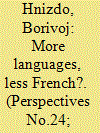

|
|
|
| 20 |
ID:
089796
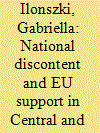

|
|
|
|
|
| Publication |
2009.
|
| Summary/Abstract |
As the European Union (EU) is being constructed increasingly as a political entity more attention is being paid to how its institutional evolution corresponds to national demands.
|
|
|
|
|
|
|
|
|
|
|
|
|
|
|
|
|
|
|
|
|